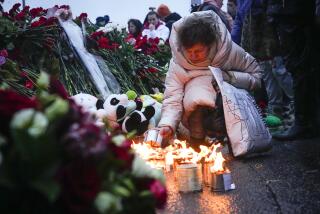Yeltsin Men Quickly Take Charge of Kremlin Spoils
- Share via
MOSCOW — Having won the Kremlin in a peaceful ambush, Russian Federation President Boris N. Yeltsin swiftly sent his men over to the ancient fortress Thursday to take inventory of his spoils.
Dressed in civilian clothes, they went from room to room in the red-brick citadel, the seat of authority for more than seven decades of Soviet rule and five centuries under the Russian monarchy.
They counted how many computers, televisions, telephones and other valuables are in the Kremlin’s official buildings, said Andrei I. Belyayev, press spokesman for the Supreme Soviet, the Soviet legislature, which meets there.
Then Yeltsin’s men let staffers on duty know that they would be evicted in days, in keeping with the Russian leader’s decree that all Soviet buildings, including the Kremlin, the belongings and the assets of the Soviet president and the Inter-Republic Economic Committee, had been transferred to the Russian administration.
“When I came to work this morning, I was not sure they would let me in the gate,” Belyayev said in an interview at the Kremlin.
To make sure no one got away with anything before the big inventory, soldiers were called in Wednesday evening to search the personal belongings of everyone leaving the buildings. The troops were double-checking that no one carried away any Kremlin property, Belyayev said.
“Do they think we are going to steal the Kremlin away from Moscow?” he asked.
“This is great Russian boorishness,” he added. “It’s very offensive.”
Earlier in the week, Yeltsin had sent his own guards to stand at the majestic Kremlin gates, Belyayev said.
Even the famous soldiers who goose-step out to change the guard at the mausoleum of V. I. Lenin, founder of the Soviet state, now are subordinate to Yeltsin.
Soviet President Mikhail S. Gorbachev still arrives at Spassky Gate every morning in a black Zil limousine accompanied by three other such vehicles. But the Zils, his personal staff and his 42 personal bodyguards are just about all he commands these days, Belyayev said.
The symbolic transition of power started as early as last June when, after Yeltsin won the Russian Federation’s first popular election for president, Gorbachev gave his office in the Supreme Soviet building to Yeltsin and took new quarters in the neighboring Council of Ministers building, also inside the Kremlin.
Gorbachev still occupies those offices, the traditional quarters of Soviet leaders, but the rest of the Kremlin already seems to have slipped from his control.
Although the Kremlin commandant’s office denied receiving any new instructions about guarding the buildings, according to the news agency Tass, his guards did not stop Yeltsin’s men from inspecting the premises or searching the Kremlin staff. Until now, the Kremlin commandant has reported directly to Gorbachev.
Belyayev said the Kremlin had not seen such turmoil since the so-called “time of troubles,” a chaotic period between Russian dynasties in the late 16th and early 17th centuries.
The only explanation for Yeltsin’s acting so quickly, Belyayev said, was that he wanted to complete his move before the other republics were able to claim their share of the Kremlin’s valuables.
Yeltsin’s team could not respond to questions about what exactly in the Kremlin is now considered Russia’s property because everyone with authority to speak to the press was with Yeltsin on a visit to Italy, a secretary at his press office said.
Besides the golden onion-domed cathedrals that grace the Kremlin’s grounds, the citadel is home to a vast collection of czarist treasures and a collection of imperial jewels.
Even when the capital of the Russian empire was moved to St. Petersburg in the early 18th Century by Peter the Great, czars were still crowned in the Kremlin because it was the seat of the Russian Orthodox Church.
The Kremlin stopped being the center of spiritual life during the Soviet era, but now there is a movement to return the Kremlin’s cathedrals to the church.
For the past two years, the liveliest action in the Kremlin has been the meetings of the Soviet legislature, the Supreme Soviet, but events have also passed Soviet deputies by.
Soviet lawmakers, who were first to engage in real debate in the Kremlin after decades when the legislature merely rubber-stamped Communist Party decisions, had felt themselves at the center of power, creating the country’s first democratic forum.
They were insulted by the speed with which the Russian government was laying claim to the Kremlin hall where they met, the skyscraper nearby where their committees worked and even the housing complex on the outskirts of the city where they themselves lived.
“They’re acting like barbarians,” complained Viktor N. Kiselev, 42, a Soviet lawmaker from Kamchatka in the Soviet Far East, who is a member of the legislature’s committee on law and legislation. “They’re breaking every law possible.”
“They have claimed everything,” Vladimir Y. Karepin, 43, a legislator from the city of Ulan-Ude, near the Mongolian border, commented. “No one told us to gather our things and get out. But I expect this order will come in the next few days.”
More to Read
Sign up for Essential California
The most important California stories and recommendations in your inbox every morning.
You may occasionally receive promotional content from the Los Angeles Times.













